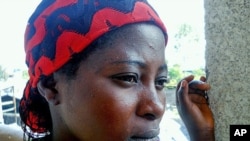In the Democratic Republic of Congo, a war that formally ended in 2008 still rages in the countryside. International organizations say all types of military groups are guilty of recruiting or abducting children, including countless numbers of girls, to serve as soldiers, porters, spies, scouts, cooks and sex-slaves.
When Alliance was 13 years old, she met a group of soldiers returning from battle on the road to the market. The soldiers grabbed her and four other girls. She does not know what ever happened to the other girls.
Alliance says she crawled away from the military camp three months later on her elbows through the jungle. After the months of cooking, foraging for food and twice-daily beatings, Alliance said she wanted to get out before she was killed. Once clear of the camp, she and another child soldier began running until they found a road and civilians who helped them get home.
When they returned to the village, they found their funerals already had been held.
UNICEF says more than 31,000 children - 20 percent of them girls - have been rescued from militias or have escaped from them in the past seven years. And while the organization says thousands of children are still serving in militias, officials say it is impossible to know exactly how many.
The deputy team leader of the U.N. child demobilization program in North Kivu Province, Patrick-Cyrille Garba, said girls are less likely to escape or be rescued from militias than boys. Commanders keep girls hidden, he said, afraid they will accuse soldiers of sexual assault if they get out.
Garba says it does not take a doctor to tell that boys and girls that do escape are emotionally and physically scarred.
"Obviously they are traumatized, most of them," he said. "It does not require proper screening to know that they are traumatized. They are completely lost. They are completely in disarray."
At the Tumaini Center, a vocational school that specializes in training former-child soldiers, Alliance now studies cooking. She said that when she got back to her village, she was shunned by former neighbors, and her family refused to continue to pay for school.
Alliance said she was accused of being a "rebel wife" and viewed as dirty because everyone assumed she had been raped. People in her village also thought she sympathized with the rebel army, which is known for raping, looting and burning homes. She said it was like being cursed.
Tumaini Center Director Pascal Badibanga Zagabe said after life in the military, many girls display aggressive behavior and have trouble re-integrating into normal society or even into his school to help them.
In the military groups, girls usually are cooks and porters. Often, he said, they also are used as 'bush wives' or sexual slaves.
At the center, girls study cooking or sewing in the hope of making a living when they finish the program. But the school, he said, is poor, and his students, who are former-child-soldiers, street children, unwed mothers and other children without access to school, have no resources of their own. On days when the World Food Program does not give them food, he said, students drop out of the program from hunger.
Army officers say armed children in Congo are fighting in a war that ended on paper three years ago. The nature of the battles has changed, they say, but the conflict never stopped. Homegrown militias, loosely integrated into the army, fight rebel forces that originated in neighboring Rwanda, Uganda and Burundi. Other battles are internal, among warring Congolese communities. And with $24 trillion of mineral wealth believed to be buried in Congolese soil, many militias survive by fighting for control of the mines and roads.
For some girls, like 18-year-old Pascaline, the horrors of the war continue every night in her dreams. She said she often wakes up crying, after having nightmares about the day she was taken.
Pascaline said she was kidnapped two years ago with five other young women. Her life was spared, she said, because the commander’s wife decided to make Pascaline her servant rather than allow the soldiers to rape her. Two of the other women fought back when the men tried to rape them, and they were killed slowly with knives.
Now studying sewing at the Tumaini Center, Pascaline said she can never go back to her village. Besides being shunned by her friends and neighbors, she said she fears the rebel soldiers will kidnap her if she tries to go home.
Congolese Girls Abducted Into War





